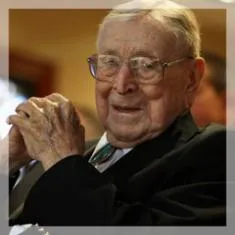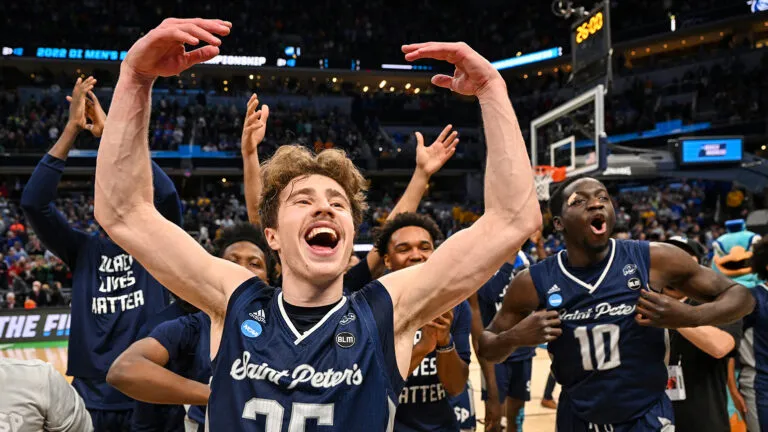My wife, Dolores, flipped on the TV one night back in 2000 and I sat down on the couch next to her. An awards show was on. Not the usual Hollywood stuff, for a change. Important people like former Sen. Daniel Patrick Moynihan, Gen. Wesley K. Clark and humanitarian Simon Wiesenthal were the honorees. The award was the Presidential Medal of Freedom, the highest honor a civilian can receive.
Dolores turned to me. “Has Coach ever won one of those?”
“I don’t think so,” I said. But as far as I was concerned, he should have. John Wooden was the most influential man in my life. I first met the legendary UCLA basketball coach in 1971 when I was a raw freshman out of Philadelphia’s Overbrook High School. There, I’d been a star player. But college was where I grew up, where I learned to be a man. A lot of that was Coach’s doing, though I didn’t make it easy for him. Not at all.
“Goodness gracious, sakes alive, André!” I remember Coach barking at me my first day at practice, after I made a nifty bounce pass behind my back. “We use the basic chest pass here at UCLA.”
Oh, yeah? I thought. Well, you haven’t seen Andre McCarter then. Back in Philly I was my own one-man show. Not to brag, but there wasn’t a player in the city who could stop me. I was the kind of razzle-dazzle player who brings a crowd to its feet. “People will pay to see you play,” a scout once told me, mapping my path through college to the pros and NBA stardom. Colleges from across the country recruited me. Basic chest pass? I wanted more freedom than that. Even if it was UCLA.
Inevitably Coach and I knocked heads. Coach was no-nonsense. He began his career as a schoolteacher in a small, God-fearing Indiana town. He preached efficiency, precision and hard work—all of it rooted in a strong, straightforward faith. He didn’t have patience for frills. Coach Wooden seldom raised his voice and never swore, but man, he could be tough. One day I was five minutes late to a pregame meal. The next four games I lost my place in the starting lineup.
Things came to a head the first day of practice my sophomore year. Back then UCLA was a college basketball dynasty. Coach Wooden was revered and much imitated. He had led the school to seven national championships in the previous eight years. The stands were filled with college coaches from all over who had come to campus hoping to see how Coach did it. Some of them had tried to recruit me back in high school. I felt like I was onstage too.
Coach blew his whistle and play began. Greg Lee, the starting point guard whose job I wanted, had the ball. I was playing on the second team. Greg came at me, and with a quick swipe I stole the ball and raced downcourt. My teammates were open. But instead of passing the ball, I dribbled the length of the court, faked a behind-the-back pass toward one of my teammates and put it in the basket myself, leaving star center Bill Walton staring at air. The visiting coaches came to their feet. My adrenaline surged.
Coach Wooden jumped to his feet too. “Goodness gracious, sakes alive, Andre,” he screamed. “You do that again, you won’t play on our team!”
I’d expected a slap on the back, not a reprimand. Coach and I had a rocky road after that. My style against his, showmanship against fundamental play. And Coach Wooden wasn’t about to change his style. I thought about transferring to another school. “We’ll give you the freedom to play the way you want,” one rival coach said. They enticed me with all sorts of promises. I didn’t know what to do.
So I called my mom. “Coach and I aren’t getting along. I’m thinking of leaving.”
“It sounds to me like you’re not thinking, period,” Mom shot back. “Coach Wooden won a whole bunch of championships before you got there. The man must know something about the game, something you probably have not figured out yet.”
A few days later I stayed after practice, shooting baskets alone in the gym. Set shots and jump shots. Swish went the ball. Nothing but net. I wasn’t really working on my game, just trying to relax. But Mom’s words kept coming back to me. So did Coach Wooden’s. “Our team,” he always said. Swish. Why hadn’t it occurred to me before? Coach and I were after the same thing: We wanted UCLA to be the best team in the country. Coach was a spiritual man. So was I. Swish. What I needed to ask God was hard for me. I held the ball and closed my eyes. Lord, I prayed, give me the strength to put my ego aside. Help me change my attitude.
I decided to learn everything I could about Coach Wooden. I read everything he wrote, every article that was written about him. I studied his coaching technique, his basketball philosophy, why he believed what he believed, everything.
Most of all, I focused on a framed diagram that hung above his desk. It was called the Pyramid of Success. Its cornerstones were industriousness, cooperation and enthusiasm.
“Winning basketball has nothing to do with the highlight plays you see on TV,” Coach said one day at practice. “Teams win because they play unselfishly, and their players have solid fundamentals.” A good basketball lesson, yes. But I—and my teammates—knew he was preparing us for something more important. I realized the skills he taught on the court had as much to do with life as basketball. And that’s why he was so passionate about teaching.
Basketball was just something to prepare us to be good students of life.
I didn’t just change my attitude; I changed my game. Where once I would have driven to the basket one-on-one against the other team’s biggest star, now I looked to make a crisp chest pass to a teammate waiting under the basket. My junior year, Coach made me the starting point guard. He encouraged me to take a leadership role on the court and in the locker room. That spring of 1975, we beat Kentucky 92-85 to win the national championship—Coach’s tenth. “Andre,” he told me in the locker room, “you were my coach on the floor.” I lowered my head, smiled, tried not to cry. There couldn’t have been a better compliment. That title, as it turned out, was his last. He retired after that season.
I went on to play two seasons in the NBA. It was a good career, but I was never the superstar I fantasized about being back in Philly. I was a better player, though. After the pros, I worked as an assistant coach at Haverford College in Pennsylvania and then at UCLA under Walt Hazzard—the star point guard who led Coach’s first championship team, in 1964, and graduated from my high school.
By then I was in my 30s. Maybe it was because I was coaching that Coach was on my mind. Then it hit me: Had I ever properly thanked Coach Wooden?
“Andre?”
I snapped out of my reverie. The awards show had gone to a commercial. Dolores looked at me and said, “Why don’t you nominate Coach for a Presidential Medal of Freedom?”
I was thinking the same thing.
I did some research. President Harry S. Truman established the award in 1945, to recognize those who had served their country in World War II. In 1963 President John F. Kennedy reintroduced it as a way to honor distinguished civilian service in peacetime. Coach Wooden had led 27 UCLA teams. And he had changed hundreds of lives, including mine.
That’s what I would do, nominate him for the Presidential Medal of Freedom. All that was required was a letter of recommendation to the president. One letter from me wasn’t going to do it. So I contacted almost everyone who had ever played for him at UCLA—not just the big stars, like Walton and Hazzard, but players whose lives he had bettered in more private ways. Like me. “Just tell what he meant in your life,” I told everyone, because there wasn’t a man who had played for Coach Wooden who hadn’t felt his effect somehow. I added, “Keep this a secret. If Coach finds out, he’ll put a stop to it.”
Soon letters arrived, some typed on fine stationery, some handwritten. One guy said he was too busy. I phoned his mother. She called him to her house and ordered him to sit down and write. I ran into a forgetful guy at a party. I poked him in the chest. “Where’s my letter?”
Five months later I had 32 letters. I sent them and a copy of Coach Wooden’s Pyramid of Success to President Bill Clinton. Then I waited.
No dice.
The next year, 2001, I resent the letters to President George W. Bush. We never heard back.
Late in 2002 I tried again. Nothing. Then last July I got a call from an old UCLA friend. “Andre, did you see the article in the Los Angeles Times? Coach Wooden got the award.” I could hardly believe it. Coach couldn’t either. He thought it was a prank until a presidential aide confirmed it.
“Andre,” Coach said. “Andre, Andre.” Then he fell silent. This, from a man who was never at a loss for words. It brought tears to my eyes. “Andre,” Coach said again, and trailed off. We were both too choked up to talk. Finally I managed to tell Coach how much I loved him. How much he had taught me. We had come full circle.
“I think about you every day,” I said. “There’s a kid on my team, a lightning-quick point guard named DeJuan who reminds me of me. Guess what I’m teaching him? The Pyramid of Success.”
Next thing you know, I’ll be saying, “Goodness gracious, sakes alive.”





